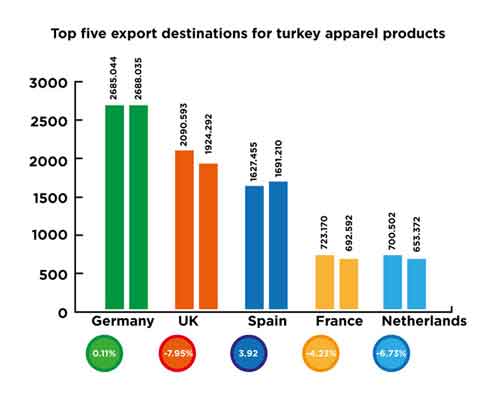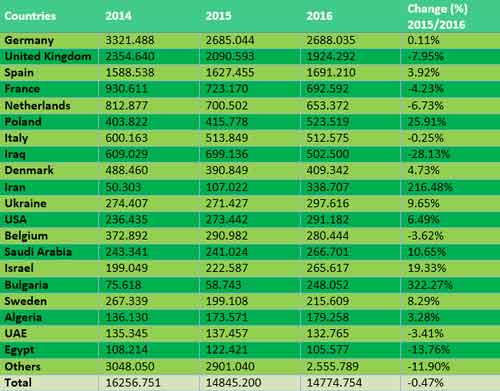Turkey also remains among one of the world’s most important textile and apparel manufacturing countries and 6th largest supplier in the world and the 3rd largest supplier to the EU.
Akhi Akter & Mir Abdullah Al Mahfuz
The Republic of Turkey, stretching from southeastern Europe across the Anatolian peninsula in western Asia, has a textile manufacturing history dating back to the Ottoman Empire.
Today, Turkey also remains among one of the world’s most important textile and apparel manufacturing countries. After vehicles, clothing is Turkeys’ most successful export product, which earned 9.4% of the country’s total exports, of them knitwear amounted to US$ 8.8bn (5.6% of total export), while exports of woven clothing reached US$6.0bn (3.8% of the total) in 2017.
Exports of both the Turkish textile and clothing industries achieved a modest growth in 2017, rising 2.5% and 3.0% respectively. Industry leaders have predicted that 2018 will be better. Last year, textile exports amounted to around US$10bn and clothing exports to around US$ 17bn.
Hikmer Tanriverdi, Chairmen of the Istanbul Apparel Exporter’s Association, forecasts an 8-10% increase in clothing exports in 2018.
According to World Trade Organization (WTO) data 2016, Turkish clothing industry with a share of 3.39% is the 6th largest supplier in the world and the 3rd largest supplier to the EU. It has a share of 4.06% in knitted and a share of 2.73% in woven clothing exports in the world.
Strengths of the Turkish textile and apparel industry
Turkish textile and clothing industry has a significant role in world trade with the capability to meet high standards and can compete in international markets in terms of high quality and a broad range of products. Turkey exports not only readymade garments; it also exports fabrics to the world. European countries, including Italy, Russia, Germany, Romania, and Bulgaria etc. are the most important markets for Turkey’s fabric exports.
In 36 years from 1980 to 2018, the production and export of the industry shifted from low value-added commodities to high value-added manufactured items and fashionable goods. Major strengths of the Turkish textile and apparel industry are:
- qualified and educated human resources,
- design capacity,
- accumulation of know-how,
- investment in technology,
- dynamic and flexible production capacity,
- advanced sub-industry in the clothing sector,
- concern about quality, health, and environment.
Apparel export trends
For the last two years, the industry has been stable despite geopolitical conditions in the neighboring countries and diplomatic tension between Turkey and leading European Union (EU) countries. With its fashion-oriented and quality products, Turkey has been increasing her share in the main markets, especially in the European market.
Figure 2: Top five markets for Turkish apparel products (value in USD million). The value in the bottom round shows a change in percentage year on year.
In 2014, the total value of clothing exports was US$ 16.26 billion. Approximately 80% of the clothing exported is cotton clothing. Knitted clothing and accessories, with an export value of US$ 10.02 billion, had a share of 61.66% in total clothing exports, and woven clothing had a share of 38,34% with a value of US$ 6.23 billion in 2014.
“Women’s or girls’ suits, ensembles, jackets, blazers, dresses, skirts, divided skirts, trousers, etc.” and “Men’s or boys’ suits, ensembles, jackets, blazers, trousers, bib and brace overalls, breeches, etc.” are the most important export products in woven clothing sector.
In 2016 exports of “Women’s or girls’ suits, ensembles, jackets, blazers, dresses, skirts, divided skirts, trousers, etc.” and “Men’s or boys’ suits, ensembles, jackets, blazers, trousers, bib and brace overalls, breeches, etc.” were USD 2.27 billion and US$ 1.51 billion, respectively.
Turkish textile production factors
Turkey has several advantages in textile production as well as the supply of raw materials based on the following points:
- In terms of logistics, the country has a strategic location as it is the gateway to European markets.
- The county is a rich source of the raw materials that are used for the production. Turkey ranks number 7 in global cotton production.
- With its liberal trade policies equipped with the highly skilled labor force, the country is able to have a well-developed industry that can produce quality products.
- The country has entered customs union agreement with EU and free trade agreements with other countries.
- Turkey is also noted for giving importance and priority to the working conditions of their labor force.
- Turkey continues to invest in utilizing advanced technologies to grow their industry.
Competitiveness of the textile industry
Although the Turkish textile industry has been experiencing stable growth over the years, it is facing challenges, as the country is now required to compete with China. It is beginning to lose its advantage due to China’s low labor cost.
Hadi Karasu, Chairman of the Turkish Clothing Manufacturer’s Association (TGSD), recently said, “China’s ‘One Belt, One Road’ project is a threat for the Turkish apparel industry. Primarily, China carries its apparel industry to Western China where cheap labor is intense. Therefore, China will be threatening Turkey by its easier access to EU and the project will be pressurizing this very important competitive advantage of Turkey.”
To maintain its competitive edge, local producers have to create more creative and innovative designs that target high-income groups. As the sector is also negatively affected by the decision of the EU to enter free trade agreements with South Korea and India.
In response to the increasing competition, the Turkish government aims to provide more assistance to its domestic producers by coming up with programs like the Turquality program. It is specifically created to make domestic producers become more competitive.
Conclusion
Today, Turkish textiles and clothing industry is the most outward-oriented industry that can compete with any other countries in the international markets in terms of high quality and a wide range of products. Turkey has already increased its cotton production, which will put it on track to become less dependent on external sources of cotton.
At the same time, the government of the country is very concern to eliminate the remaining problems in the industry, therefore, in near future, Turkey might be the strongest competitor for its major rival countries.
Source:TextileToday






















